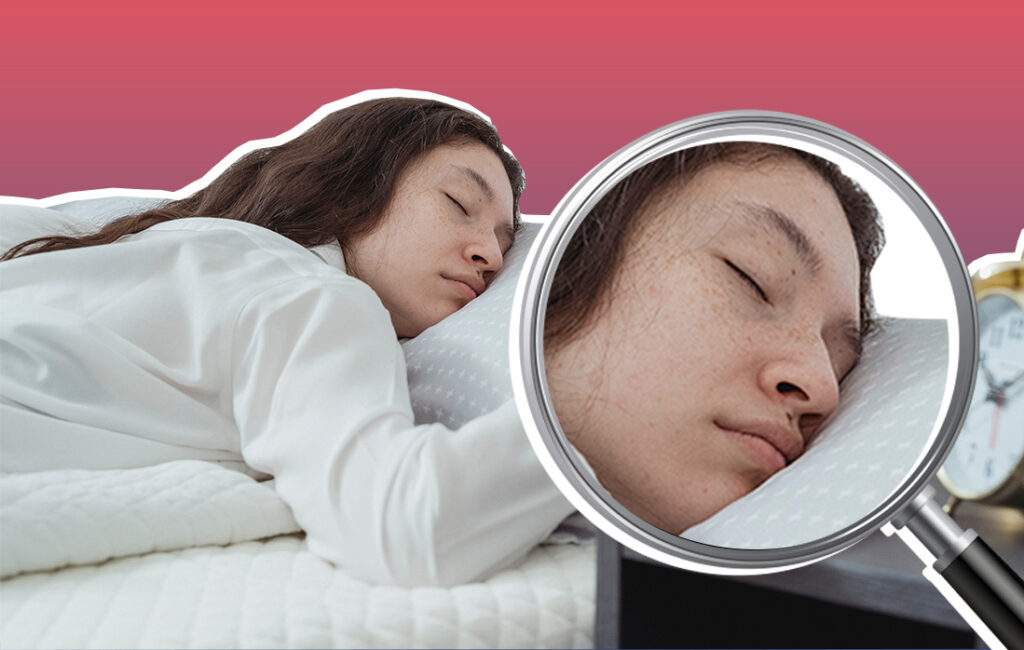
In the latest viral trend that TikTok built, the Silvi pillowcase is on the fast track to becoming a cult classic. And while silk pillowcases have long-topped desert island must-haves lists for many beauty enthusiasts, this latest video (that’s already racked up 23M views) finds one TikTok user leaning into his inner scientist to make his case for switching to silk pillowcases, and the proof is in…the Petri dish?
In this eye-opening (and, can we add, incredibly gross?) experiment, @peakplant cuts a swatch from his partner’s cotton pillowcase and a swatch from a Silvi pillowcase. He then puts each swatch in its respective petri dish and logs the results over the course of a week. By day seven, the cotton swatch is riddled with bacteria, while the Silvi swatch remains clean and clear.
@peakplant♬ original sound – peakplant
So what’s the deal? Well, we did some digging on the Silvi pillowcase to get to the bottom of this mystery.
Silvi Is “Not Your Average Silk Pillowcase”
So, while silk is the headliner for the Silvi pillowcase, it looks like the devil’s in the details — or in this case, the silver. With medicinal uses dating back thousands of years, silver has long been known for its antimicrobial properties. Fast forward to 2024, and Silvi has dusted off this powerful antibacterial agent and incorporated it into the brand’s The Anti-Acne™ Silk Pillowcase.
In the first of its kind, Silvi promises that its pillowcases can “eliminate 99.7 percent of bacteria linked to acne and topical skin concerns.” In 30 days, Silvi claims that their pillowcases can curb and prevent a host of skin and hair concerns, including:
- Acne and breakouts
- Fine lines
- Clogged pores
- Frizziness
- Breakages
- Tangles
- Split ends
Beyond digging into the science here to corroborate @peakplant’s claims that silver and silk make great bedfellows, we noticed that the Silvi silk pillowcase has over 2,000 five-star reviews. Real-world users shared their stories of real-world performance, and it looks like Silvi lives up to the hype.
The Benefits of Silk Pillowcases
It’s not hard to argue that silk “anything” is insta-worthy, so there’s no shortage of folks hocking silk pillowcases on every platform with pretty photos and videos. Some have even thrown in their two cents about the supposed benefits of said pillowcases. And much like Silvi, the claims often center around nourishing your skin, taming frizzy bedhead, and regulating temperatures while you sleep. But are these claims valid?
Dr. Debra Jaliman, a board-certified NYC dermatologist and author of the book, Skin Rules: Trade Secrets from a Top New York Dermatologist, says yes — but there are limitations. Unlike cotton, “silk allows your skin to glide over the surface of the pillow, so if you sleep on your side or stomach, it can help prevent fine lines or “sleep lines,” she says. Ultimately, Jaliman notes, “silk isn’t going to help sagging skin. Just fine lines. And if you sleep on your back, it doesn’t make a difference.”
Ingrid Leo, a resident doctor at Kliniken Valens in Switzerland, adds that silk isn’t as absorbent as cotton, so “sleeping on silk helps to preserve natural moisture and hydration.” That’s why most people wake up feeling like their skin is smoother, their hair is shinier, and their wrinkles have seemingly ironed out overnight.
Leo also tells Sleeopolis, “Silk is a good thermoregulator and naturally hypoallergenic fabric that helps keep you cool in the summer and warm in the winter.”
So, if you’re looking to manage nighttime hot flashes, you generally sleep hot, or you want to make your forty winks a bit cozier, silk is where it’s at.
How to Care for Silk Pillowcases
If you’re making the switch, Leo cautions that while silk has a lot going for it, “it may be less effective at absorbing sweat, saliva, and oils from the face, so more frequent spot cleaning may be necessary to maintain proper hygiene.”
And while silk shouldn’t be tossed into your washing machine with your favorite jeans, you can clean and maintain your silk pillowcase without having to spend a small fortune with your local dry cleaner.
If You Wash Your Silk Pillowcases by Hand
If you choose to wash your silk pillowcase by hand, start by adding some mild detergent to a basin filled with water. Place your pillowcase in the water and swish it around gently. You want to “agitate” it enough to get clean without being too rough — do not rub or twist. When you’re done, remove the pillowcase from the water, and again, do not wring or twist; pat to absorb excess water if need be. Lay it on a towel to dry or hang it to air dry.
If You Wash Your Silk Pillowcase in the Washing Machine
While you shouldn’t throw your silk pillowcase in the washer with your regular laundry, you can wash them in the machine. Just be sure to use a mesh wash bag to keep pulls, snags, and rough spin cycles from damaging them. Once the cycle is done, follow the same directions outlined above for drying silk pillowcases: lay them flat or hang them to air dry.
Are Silk Pillowcases Right for You?
Silk pillowcases can keep fine lines in check and frizzy hair at bay, but for anyone looking for an answer to their acne and breakouts, silver-infused silk pillowcases should top your shortlist.
Beyond the implications for your skin and hair, the choice to make the switch from the usual suspects for pillowcases (cotton, microfiber, bamboo) may ultimately depend on your personal preferences and budget. Some of these can hit your bank balance anywhere from $20 to upward of $600 (there are even some in the thousands).
For a look at some great options, you can take a look at our guide to the best silk pillowcases.
The TLDR: Silk pillowcases can be a good investment, but it’s important that you manage your expectations.


























